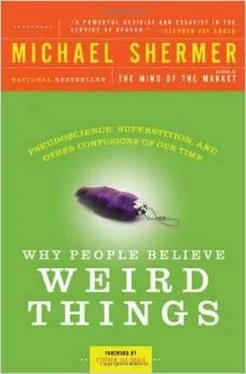Michael Shermer - Why People Believe Weird Things - Pseudoscience, Superstition and Other Confusions of Our Time. Abstract of the book
Здесь есть возможность читать онлайн «Michael Shermer - Why People Believe Weird Things - Pseudoscience, Superstition and Other Confusions of Our Time. Abstract of the book» весь текст электронной книги совершенно бесплатно (целиком полную версию без сокращений). В некоторых случаях можно слушать аудио, скачать через торрент в формате fb2 и присутствует краткое содержание. Жанр: Психология, на английском языке. Описание произведения, (предисловие) а так же отзывы посетителей доступны на портале библиотеки ЛибКат.
- Название:Why People Believe Weird Things: Pseudoscience, Superstition and Other Confusions of Our Time. Abstract of the book
- Автор:
- Жанр:
- Год:неизвестен
- ISBN:нет данных
- Рейтинг книги:4 / 5. Голосов: 2
-
Избранное:Добавить в избранное
- Отзывы:
-
Ваша оценка:
Why People Believe Weird Things: Pseudoscience, Superstition and Other Confusions of Our Time. Abstract of the book: краткое содержание, описание и аннотация
Предлагаем к чтению аннотацию, описание, краткое содержание или предисловие (зависит от того, что написал сам автор книги «Why People Believe Weird Things: Pseudoscience, Superstition and Other Confusions of Our Time. Abstract of the book»). Если вы не нашли необходимую информацию о книге — напишите в комментариях, мы постараемся отыскать её.
debunks these nonsensical claims and explores the very human reasons people find otherworldly phenomena, conspiracy theories, and cults so appealing. In an entirely new chapter, "Why
People Believe in Weird Things," Michael Shermer takes on science luminaries like physicist Frank Tippler and others, who hide their spiritual beliefs behind the trappings of science.
Shermer, science historian and true crusader, also reveals the more dangerous side of such illogical thinking, including Holocaust denial, the recovered-memory movement, the satanic ritual abuse scare, and other modern crazes.
is an eye-opening resource for the most gullible among us and those who want to protect them.
Who should read it?
Anyone interested in science or psychology
Anyone who wants to learn about incorrect but widely held beliefs
Anyone interested in the difference between science and faith
Who's the author?
Michael Shermer is a science journalist, historian and founder of The Skeptics Society – a non-profit organization of over 55,000 members that promotes scientific skepticism and fights pseudoscience. He’s the editor in chief of
and writes monthly for
. He’s also published many other books, such as
and
.












